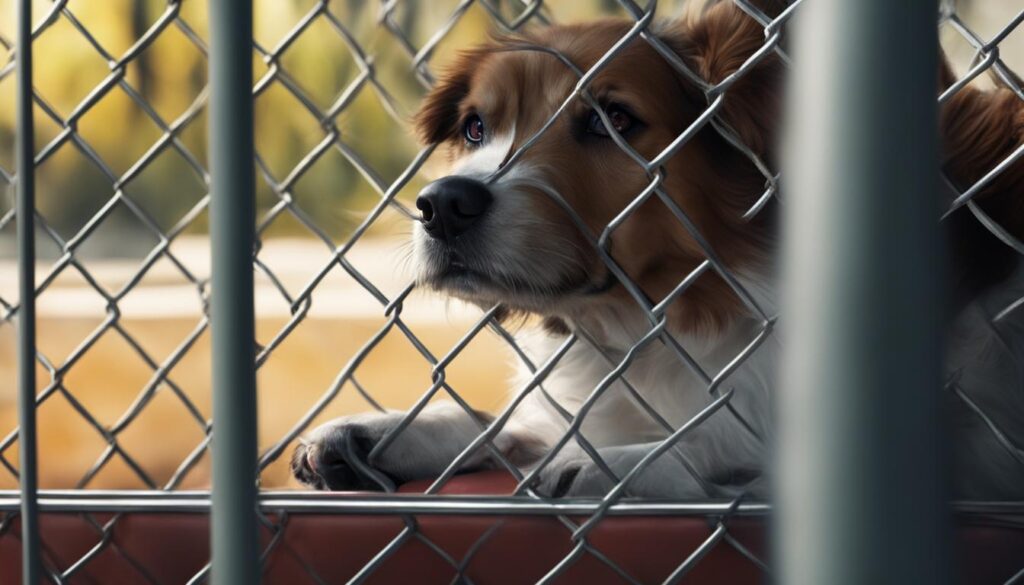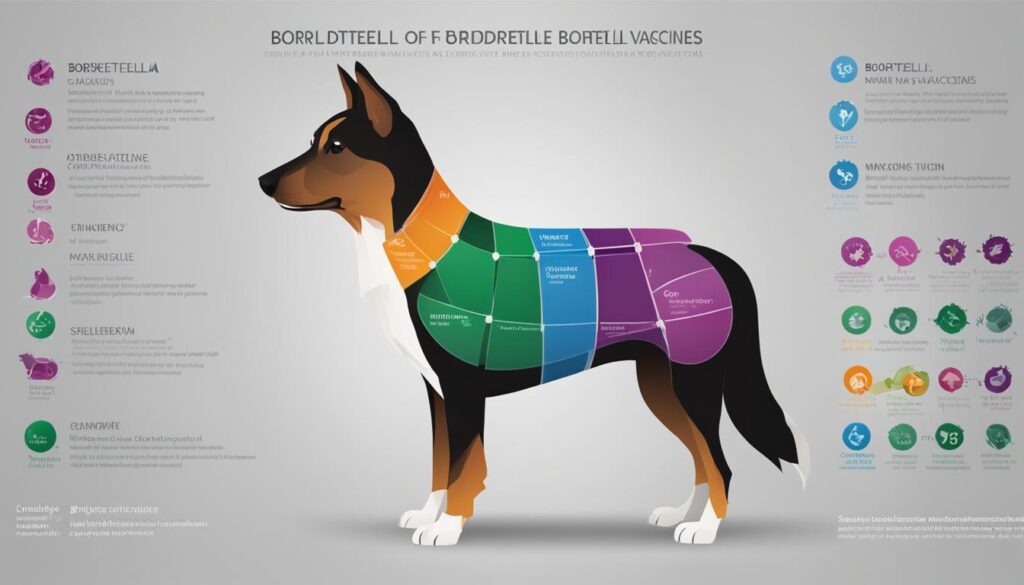Welcome to my article on the Bordetella vaccine for dogs. In this comprehensive guide, I will provide you with valuable information about this important vaccine and its benefits in protecting your furry friend’s health. Whether you’re a new dog owner or an experienced one, understanding the importance of the Bordetella vaccine is crucial for ensuring your dog’s well-being.
Key Takeaways:
- The Bordetella vaccine protects dogs against kennel cough, a highly contagious respiratory illness.
- Dogs frequently exposed to other dogs in social or boarding settings are at higher risk of contracting kennel cough.
- Kennel cough can lead to complications in puppies and senior or immunocompromised dogs.
- Consult with your veterinarian to determine if your dog is at risk and when they should receive the Bordetella vaccine.
- Regular vaccination can significantly reduce the severity and duration of kennel cough symptoms and prevent complications.
What is Bordetella and Kennel Cough?

Bordetella bronchiseptica is a bacterium that causes inflammation of the upper respiratory system in dogs, leading to kennel cough. Kennel cough, scientifically known as canine infectious tracheobronchitis, is a highly contagious respiratory illness that affects dogs of all ages.
The transmission of kennel cough occurs through aerosol droplets when an infected dog coughs or sneezes. Direct contact with infected dogs or contaminated surfaces can also spread the disease. The close proximity of dogs in boarding facilities, dog parks, grooming salons, and training classes increases the risk of transmission.
The most common symptom of kennel cough is a honking cough that often sounds like the dog has something stuck in its throat. Other symptoms may include a runny nose, sneezing, loss of appetite, lethargy, and a low-grade fever. In most cases, the symptoms are mild, and dogs recover within a few weeks without treatment. However, in some cases, kennel cough can progress to more severe respiratory infections or pneumonia.
To treat kennel cough, it is important to provide rest and minimize stress on the dog’s respiratory system. Cough medicines may help alleviate symptoms, and antibiotics may be prescribed to prevent secondary bacterial infections. It is crucial to consult a veterinarian if your dog exhibits symptoms of kennel cough.
The Importance of Bordetella Vaccine

The Bordetella vaccine is essential for protecting your dog’s health and preventing the occurrence of kennel cough. Kennel cough is a highly contagious respiratory illness that can easily spread among dogs in social settings such as dog parks, boarding facilities, and training classes. By vaccinating your dog against Bordetella, you significantly reduce the severity and duration of symptoms, as well as the risk of developing complications such as bronchopneumonia.
Vaccinating your dog not only safeguards their well-being but also plays a crucial role in preventing the spread of kennel cough within the canine community. Many boarding facilities and training classes require proof of Bordetella vaccination to ensure the safety and health of all dogs in their care. By keeping your dog up-to-date on their Bordetella vaccine, you are actively contributing to the overall health and welfare of dogs in these social environments.
Protecting your dog’s health with the Bordetella vaccine is an important step in promoting their overall well-being and preventing the transmission of kennel cough.
Implementing regular vaccinations and taking preventive measures not only ensures the health of your dog but also provides peace of mind for yourself as a responsible pet owner.
Types of Bordetella Vaccines

When it comes to protecting your dog against kennel cough, there are three types of Bordetella vaccines to consider: intranasal, oral, and injectable. Each vaccine offers its own set of advantages and considerations, making it important to choose the right one based on your dog’s needs and circumstances.
Intranasal Bordetella Vaccine
The intranasal Bordetella vaccine is the most commonly used option. It provides rapid protection, with immunity developing within 48 hours of administration. This vaccine is given through a nasal spray and can be administered to puppies as early as 3 weeks of age. Its quick onset of action makes it an ideal choice for dogs at immediate risk of exposure to kennel cough.
Oral Bordetella Vaccine
The oral Bordetella vaccine is another effective option for preventing kennel cough. It is administered by mouth, making it easy to give to puppies as young as 7 weeks old. Although it may take slightly longer for immunity to develop compared to the intranasal vaccine, it still provides reliable protection against kennel cough.
Injectable Bordetella Vaccine
The injectable Bordetella vaccine is administered as a subcutaneous injection, similar to core vaccines. It typically takes approximately 7 days after the booster dose to provide full protection. The injectable vaccine is a good choice for dogs who may have difficulty receiving the intranasal or oral vaccines. However, it’s worth noting that it may take longer for immunity to develop compared to the other two options.
When deciding on the right Bordetella vaccine for your dog, there are several factors to consider, including age, health, lifestyle, and potential exposure to other dogs. Consulting with your veterinarian will help you make an informed decision that best suits your pet’s needs.
Vaccination Schedule and Booster Shots
The Bordetella vaccine is an important preventive measure to protect dogs from kennel cough, especially those that frequently interact with other dogs in various settings such as dog parks, boarding facilities, or grooming salons. To ensure optimal protection, it is crucial to follow the recommended vaccination schedule and administer booster shots when necessary.
The vaccination frequency for Bordetella depends on the level of exposure to other dogs. Most veterinarians suggest an annual vaccination for dogs at high risk of exposure. However, some facilities may require a booster every six months to maintain an elevated level of protection against kennel cough.
For puppies, the vaccination schedule typically involves two initial doses, given 2-4 weeks apart. This helps to build up their immunity against Bordetella. Following the initial vaccination, a booster shot may be recommended every 6-12 months, depending on the dog’s lifestyle and risk of exposure to other dogs.
Recommended Bordetella Vaccine Schedule:
| Vaccination | Schedule |
|---|---|
| Puppy Dose 1 | Between 6-8 weeks |
| Puppy Dose 2 | 2-4 weeks after the first dose |
| Booster Shots | Every 6-12 months, based on risk of exposure |
It is crucial to consult with a veterinarian to determine the most appropriate vaccination schedule for your dog. The veterinarian will consider factors such as age, health, lifestyle, and potential exposure to other dogs when determining the optimal timing for booster shots.
By following the recommended vaccination schedule and administering booster shots as necessary, you can provide your dog with the best possible protection against kennel cough and ensure their overall health and well-being.
Risks and Side Effects of Bordetella Vaccine

Vaccinations are an essential part of maintaining your dog’s health and protecting them from various diseases. However, it’s important to be aware of the potential risks and side effects associated with the Bordetella vaccine.
While the Bordetella vaccine is generally safe, certain factors may increase the risks associated with its administration. Your veterinarian may advise against the vaccine if your dog is immunocompromised, pregnant, or sick. Additionally, if your dog has a history of vaccine reactions, it’s crucial to discuss this with your veterinarian before proceeding with the Bordetella vaccine.
Mild side effects of the Bordetella vaccine can include temporary lethargy, a low-grade fever, sneezing, a runny nose, or slight pain at the injection site. These side effects typically resolve within a few days and do not pose a significant threat to your dog’s well-being.
However, if your dog experiences severe or persistent reactions following the administration of the Bordetella vaccine, it is essential to report these symptoms to your veterinarian. They can provide guidance and assistance in managing any adverse reactions that your dog may be experiencing.
Allergic reactions to the Bordetella vaccine are rare but possible. If you notice any signs of an allergic reaction, such as difficulty breathing, facial swelling, hives, or severe vomiting, seek immediate veterinary care. Timely intervention is crucial in managing allergic reactions and ensuring your dog’s safety and well-being.
Bordetella Vaccine for Puppies

Puppies are susceptible to respiratory illnesses, including kennel cough, which can be easily transmitted in environments where dogs interact with each other. To protect puppies against kennel cough, it is essential to include the Bordetella vaccine in their vaccination schedule.
The Bordetella vaccine can be administered to puppies as early as 3 weeks of age, depending on the type of vaccine. The intranasal and oral vaccines can be given to puppies as young as 3 and 7 weeks, respectively, without interference from maternal antibodies.
Puppies typically need two doses of the vaccine, administered 2-4 weeks apart, to establish immunity. It is crucial to follow a puppy vaccination schedule recommended by your veterinarian to provide comprehensive protection against kennel cough and other diseases.
The Bordetella vaccine plays a crucial role in protecting puppies’ respiratory health, especially if they will be attending boarding facilities, dog daycare, or training classes where they will come into contact with other dogs. Consult with your veterinarian to determine the appropriate age for your puppy to receive the Bordetella vaccine and ensure their overall well-being.
| Vaccine Type | Recommended Age | Administration |
|---|---|---|
| Intranasal Vaccine | As early as 3 weeks | Nasal spray |
| Oral Vaccine | As early as 7 weeks | Oral administration |
Bordetella Vaccine and Pet Insurance

When it comes to pet insurance, coverage for vaccines can vary depending on the plan. Vaccines are typically considered preventative care, and some policies may not include coverage for routine vaccinations, including the Bordetella vaccine. However, there are pet insurance providers that offer optional preventative care packages that can help offset the costs of routine visits, parasite screenings, and vaccinations, including the Bordetella vaccine.
It is important to thoroughly review the terms and coverage of your pet insurance policy to determine if vaccines, such as the Bordetella vaccine, are included. Optional preventative care packages can provide financial assistance for routine care, ensuring that your furry friend receives the necessary vaccinations to protect their health.
Preventative Care Coverage and Pet Insurance
Many pet insurance plans offer a range of coverage options, including preventative care coverage. These packages often cover routine wellness visits, vaccinations, and other preventive measures to keep your pet healthy.
By opting for a pet insurance plan that includes preventative care coverage, you can have peace of mind knowing that your pet’s routine vaccinations, including the Bordetella vaccine, may be covered. This can help alleviate the financial burden of routine care and ensure that your pet receives the necessary vaccines to protect against kennel cough and other preventable diseases.
Consult Your Veterinarian and Insurance Provider
When considering pet insurance coverage for vaccines, it is crucial to consult both your veterinarian and insurance provider. Your veterinarian can provide valuable guidance on the recommended vaccinations for your pet, including the Bordetella vaccine, based on their specific lifestyle, health, and potential exposure to other dogs.
Additionally, reach out to your pet insurance provider to inquire about their coverage options for preventative care, including vaccines. They can provide you with detailed information about the coverage and any associated costs.
By working closely with your veterinarian and insurance provider, you can make informed decisions regarding your pet’s health and ensure that they receive the necessary vaccinations, such as the Bordetella vaccine, while maximizing your pet insurance benefits.
| Pet Insurance Coverage for Vaccines | Preventative Care Coverage | Pet Insurance for Bordetella Vaccine |
|---|---|---|
| Varies depending on the plan | Available in some pet insurance plans | May be included in optional preventative care packages |
| Review policy terms and coverage | Helps offset costs of routine visits and vaccinations | Consult both veterinarian and insurance provider |
| Consider preventative care coverage | Alleviates financial burden of routine care | Make informed decisions about your pet’s health |
Choosing the Right Bordetella Vaccine
When it comes to selecting the appropriate Bordetella vaccine for your dog, several factors should be taken into consideration. Factors such as your dog’s age, health, lifestyle, and potential exposure to other dogs play a crucial role in determining the most suitable vaccine option.
The intranasal vaccine is the most commonly used form of Bordetella vaccine. It offers rapid protection and immunity within 48 hours of administration. This type of vaccine is administered through a nasal spray, making it convenient and efficient. Additionally, it can be given to puppies as young as 3 weeks old, providing early protection against kennel cough.
The oral vaccine is another option to consider. This vaccine is easy to administer by mouth and can be given to puppies as young as 7 weeks old. It is an effective way to protect your dog against kennel cough and is a suitable choice for those who may prefer an alternative to the intranasal vaccine.
If you prefer a vaccine that offers longer-term protection, the injectable vaccine might be the right choice. This type of vaccine is administered as a subcutaneous injection, similar to core vaccines. While it requires a longer timeframe for full immunity to develop, it provides an extended period of protection against Bordetella bronchiseptica.
It is important to consult with your veterinarian to determine the most appropriate vaccine for your dog’s specific needs and circumstances. Your veterinarian will consider factors such as your dog’s health status, age, lifestyle, and potential exposure to other dogs to make an informed recommendation. Your veterinarian’s expertise and guidance are essential in choosing the right Bordetella vaccine to ensure your dog receives the necessary protection against kennel cough.
| Vaccine Type | Administration Method | Age of Administration | Timeframe for Full Immunity |
|---|---|---|---|
| Intranasal Vaccine | Nasal spray | As early as 3 weeks old | Within 48 hours |
| Oral Vaccine | Oral | As early as 7 weeks old | Varies |
| Injectable Vaccine | Subcutaneous injection | Varies | Around 7 days after booster dose |
Wrapping Up
The Bordetella vaccine is a crucial tool in protecting dogs against kennel cough, a highly contagious respiratory infection. Vaccinating dogs that socialize with other dogs or frequently engage in group settings is essential to prevent the spread of this illness. By significantly reducing the severity and duration of symptoms, the vaccine plays an invaluable role in safeguarding the health of dogs and preventing complications such as pneumonia.
There are three types of Bordetella vaccines available: intranasal, oral, and injectable. Each type presents its own set of advantages and disadvantages, providing flexibility in choosing the most suitable option for your dog’s specific needs. The frequency of vaccination should be determined based on the level of exposure your dog has to other dogs, and booster shots may be necessary to maintain optimal protection.
To ensure the best outcome for your dog, it is crucial to consult with your veterinarian. They will develop an appropriate vaccination schedule tailored to your dog’s individual circumstances and provide expert guidance to safeguard their health. Protecting dogs against kennel cough through vaccination is a responsible and proactive measure that contributes to the overall well-being of our beloved furry companions.
FAQ
What is the Bordetella vaccine for dogs?
The Bordetella vaccine is a noncore vaccine given to dogs that are frequently exposed to other dogs in boarding or social settings. It protects against Bordetella bronchiseptica, the most common bacterial agent responsible for kennel cough in dogs.
What is kennel cough?
Kennel cough, also known as canine infectious tracheobronchitis, is a highly contagious respiratory illness in dogs. It is characterized by a honking cough, along with symptoms like a runny nose, sneezing, loss of appetite, lethargy, and low fever.
How is kennel cough transmitted?
Kennel cough spreads through aerosol droplets, direct contact, or contact with contaminated surfaces. It is highly contagious and easily transmitted among dogs in close proximity to each other.
Why is the Bordetella vaccine important?
The Bordetella vaccine is important for protecting your dog’s health and preventing kennel cough. It significantly reduces the severity and duration of symptoms, preventing complications such as bronchopneumonia. It is also often required by boarding facilities and training classes to prevent the spread of kennel cough.
What are the types of Bordetella vaccines?
There are three types of Bordetella vaccines: intranasal, oral, and injectable. The intranasal vaccine is the most commonly used and provides rapid protection. The oral vaccine is easy to administer, and the injectable vaccine offers longer-term protection.
How often does my dog need the Bordetella vaccine?
The frequency of the Bordetella vaccine depends on your dog’s level of exposure to other dogs. Most veterinarians recommend annual vaccination for dogs at high risk of exposure, such as those who go to dog parks or boarding facilities. Booster shots may be required every 6-12 months.
What are the risks and side effects of the Bordetella vaccine?
Vaccinations, including the Bordetella vaccine, are generally safe. However, there are some risks and potential side effects to be aware of. Mild side effects can include lethargy, low-grade fever, sneezing, runny nose, or slight pain at the injection site. Severe or persistent reactions should be reported to your veterinarian. Allergic reactions are rare but possible.
When can puppies receive the Bordetella vaccine?
Puppies can receive the Bordetella vaccine as early as 3 weeks of age, depending on the type of vaccine. The intranasal and oral vaccines can be given to puppies as young as 3 and 7 weeks, respectively, without interference from maternal antibodies.
Does pet insurance cover the Bordetella vaccine?
Some pet insurance plans do not cover vaccines as they are considered preventative care. However, some providers offer optional preventative care packages that may cover routine vaccinations, including the Bordetella vaccine. It is essential to review the terms and coverage of your pet insurance policy.
How do I choose the right Bordetella vaccine for my dog?
When choosing a Bordetella vaccine, consider factors such as your dog’s age, health, lifestyle, and potential exposure to other dogs. The intranasal vaccine is most commonly used, offering rapid protection. The oral vaccine is easy to administer, and the injectable vaccine provides longer-term protection. Consult with your veterinarian to determine the most appropriate vaccine for your dog.






